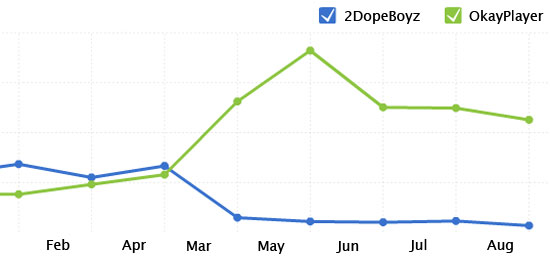The Template: Planning Your First Album
Posted by Justin Boland on Oct 01, 2009 | 0 Comments
Here’s some blunt honesty you need to hear: your album is almost definitely nowhere near ready.
At the end of 2007, I thought I had an album done, too. It was called Algorhythms and I’d put several years of obsessive re-writing into it. We mixed everything down, balanced out the levels on every track, tagged the files properly, and called it a day. What I’ve learned since then? We were not even halfway there. Your album content is not a single finished product but a media portfolio, and it looks like this:
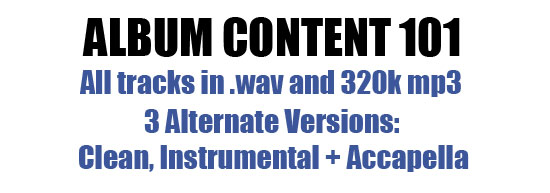
This means you’ve got 8 folders (4 versions x 2 formats) so for a 15 track album, this amounts to over half a gigabyte worth of data. If you can add stems, you should, and that would definitely increase the size of your Album Content collection further. The concept here is to get as much value out of your work as you possibly can.
Speaking of work, get ready to hate me even more. What I’ve just laid out is less than 50% of the work you need to do for a successful album launch. In 2009, hip hop has become so over-saturated that you’ll need to create a whole other project just get some attention before you drop the actual album. That’s not all: if you’ve got a back catalog of completed projects already, now is the time to start making bonus or deluxe versions to release at the same time.
Here’s a flowchart of what I’m talking about:
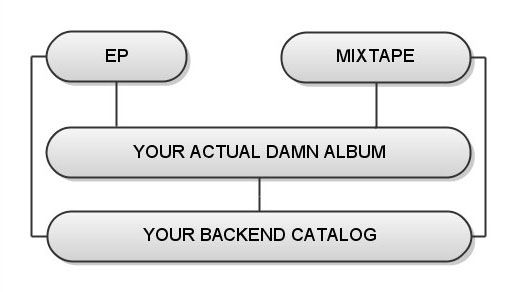
It’s up to you what kind of project you kick it off with. Obviously, an EP is less work so I’d recommend that. Once you’ve crafted 4-5 new bangers, you’ll probably be re-assessing what goes onto your album and what goes onto the EP. This is not a setback-this is healthy.
In order to launch a project successfully, you want at least 4 months in advance. It’s perfectly acceptable to release an EP and wait over a year to release a follow-up, but as long as we’re planning in advance, you should plan on keeping your momentum and going big. Don’t allow the online conversation about your music to die down.
When you’ve got a good budget, of course, you can simply step to professionals like Audible Treats and let them handle the planning and execution for you. I’m a big DIY advocate, but seriously: if you can afford them, get them. Nobody has the time or connections that a good PR team does, especially nobodies just getting started in this industry. Audible Hype is a support group for those exact nobodies, though, so let’s talk about…
Managing Your Online Album Promotion.
If you don’t already have a Gmail account, now would be an ideal time to upgrade from whatever bullshit you settled for…your career depends on your tools. Set up Google Alerts immediately for your artist name and album name, and then set up a Tumblr account so you can post links to and snippets of every single review and mention of your project, including your own content.
Next, sit down and make a list of artists you like and think you sound similar to. (If you can’t think of any, take this as a reliable sign you have no future in this business.) The reason you’re making that short list? So you can look up which blogs are consistently talking about those groups. Start writing down domain names, because you’ll be taking that list over to Compete.com.
Heads-up: Compete is a useful tool but not the “real numbers” on visitors to a website. You should check out their explanation, and especially bear in mind that their numbers are only for US internet users. I definitely recommend signing up for their free membership, which allows you to search subdomains, such as specific blogger and wordpress hosted blogs. (My favorite is Poisonous Paragraphs…respect to Dart Adams.)
What you’re doing at Compete is checking up on who’s getting the most traffic on your list. Those are the blogs you want to be reaching out to. Here’s a really key point: your relationships are more important and more powerful than your tools.
Bloggers have needs and goals of their own. They’re looking to increase traffic and a surefire method for that is exclusive releases of new music. Give them exactly that: first dibs on your new singles. (Other blogs will re-post it after the fact-reach out to those sites, too.)
Remember the point of all this work: you want your album to be put in front of the audience that wants it. You need to do research in order to figure out where that audience is. Getting your name in front of 100,000 readers of The Source might be totally useless for you…seriously. You might be much better off getting rotation on a blog that reaches 6,000 people who are already into your style of hip hop, instead of 100,000 people who are not interested in you at all, and never will be.
With this added layer of album planning, now our 4 month template is looking more complete:
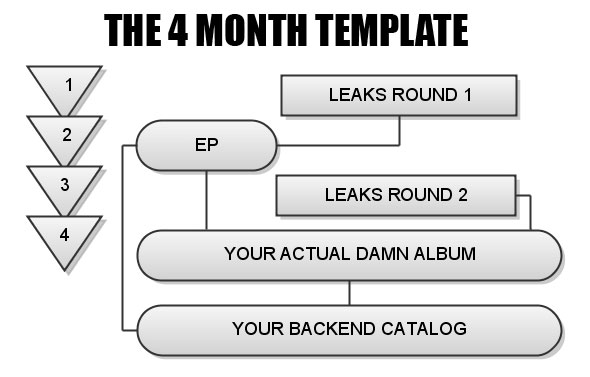
1. What about reviews? Most reviewers are happy with a link to a digital copy of the album, some of them insist on CDs. Like all other human behavior, I can’t give you a single answer. What I can tell you is that you want to get all your review copies out more than a month in advance. This gives everyone breathing room to get their reviews done in time for your release…and yes, you run the risk of getting leaked beforehand.
2. So really, what about reviews? Personally, I think you should let bloggers review your album after it drops. Having reviews come out later, even months after the fact, is actually a good thing because it extends the “tail” of your online buzz. The exceptions should probably be the blogs you’re giving exclusives to-let them have get the first review out, too. It’s easier to trust a single source because they know it’ll be obvious where the leak came from. Overall, though: let blogs review your singles and your EP/mixtape. If that content is strong enough it will build your buzz without risking leaks.
3. When should the tracks be done? You really should not be starting this 4 month process without having your tracks completed. I know that’s unrealistic, but then again, your goals of making a living off music in a genre as over-crowded as hip hop? That’s pretty unrealistic, too. This whole process will run more smoothly if the project is finished, instead of trying to finish an album at the same time you’re promoting it. The outcome is almost always the same: missed deadlines and lost credibility.
4. But what about…? “The Template” is going to be an ongoing series. I’m not gonna pretend I know everything-or even enough to call myself an expert. I’m wide open to suggestions, refinements, and most insults. The next installment will look at several case studies of how successful indie labels break an album, so we’ll be seeing many variations on the chart you see above. If you’ve got experience and you’d like to be interviewed, hit me up: powerweirdo at gmail dot com.
Until then, I want to leave you with two outside perspectives-one from independent powerhouse Godamus Rhyme, and the other from the genius behind Duck Down Records known as Dru Ha.
Godamus Rhyme
JB: Now that you’ve got a few finished projects under your belt, what are the biggest lessons you’ve learned about planning an album or EP?
#1. There is no one way to make an album.
#2. Mastering engineers are your best friend, but a shitty mix is a shitty mix. If your mixing engineer is retarded, get a new one. I don’t care if he’s free and your best friend. Your record will sound like shit and no one will listen.
#3. Quality is way more important than quantity in a tracklisting.
#4. I make better music when I have a definate goal in mind.
#5. Every artist works differently. As an engineer and producer, you have to adapt and be flexible.
The Final Word: Dru Ha of Duck Down Records
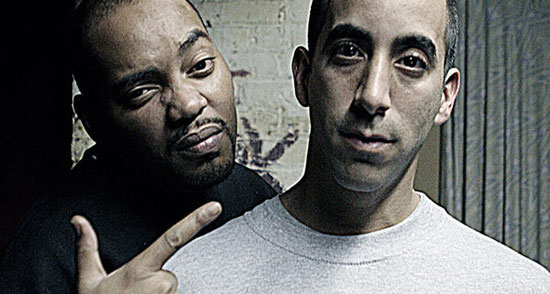
Source: Making the Mogul-(a very dope site)
Moe Arara: How do you approach your online strategy for an older, more established group like Bootcamp Clik?
I think that we’ve done some of that some over the years, and we continue to do it. Twitter being the newest craze, we haven’t really set that up too tough yet. Some of the guys here are setting that up and are showing it to Sean [Price] and other members of Bootcamp who would do it.
We keep music out there though; we’ve used the internet to document the process of putting out a new record. We post new music early ““ we like to put our music up first on our site before people hear it anywhere else so that we can drive more traffic to duckdown.com, where you can hear new music, and like you said, be part of the process…
The majority of our staff are all internet people. People like Franz, Othella and Mazza from our staff and a couple other behind-the-scenes people that we have, they help the artists with that. Sometimes they’re creating the artist’s pages for them and even maintaining them…
What it’s done now, is that you create such a following online, that even before an artist is signed, you know whether or not that artist has a fanbase, and approval form the general public, not just a group of industry insiders. You’re able to see real feedback in real-time.
It’s definitely changed the game. Most artists can’t come to labels anymore and ask to make a demo or just spit 16 bars. Now the labels ask how many friends you have on MySpace and Facebook, what are your total views on YouTube. We want to see a following…



